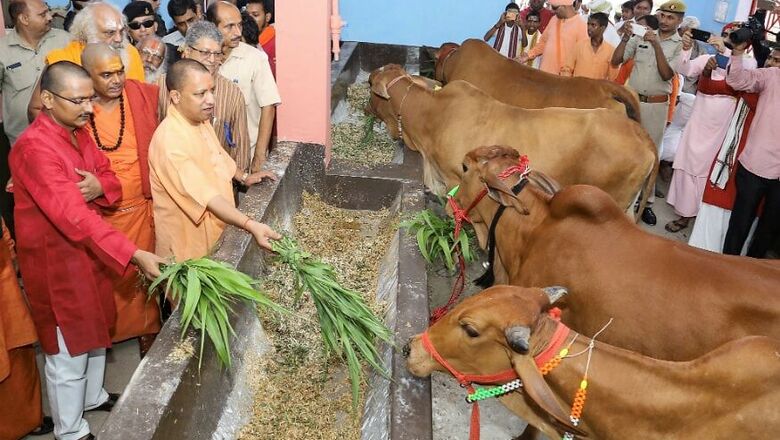
views
As 2019 Lok Sabha election results arrive, Uttar Pradesh will be playing a crucial role in deciding who gets to govern the nation for the next five years. News18 travelled to villages in the state facing stray cattle menace in an attempt to understand how the newly constructed gaushalas have affected the social and caste fabric and whether the BJP's efforts will translate into votes.
Eight-year-old Prashant Singh had been going late to school. No one, including his teachers and parents, seemed to mind that Prashant and his friends made a quick stop at the local cow shelter on his way to school.
The boys carried with them dinner leftovers and left them at the gaushala, where they folded their hands and closed their eyes to sing a prayer before rushing off.
The gaushala in Chandaus that opened in January had not just altered the school routine of some children but had changed this entire village in Uttar Pradesh’s Aligarh district. While farmers were relieved, Muslims and Dalits felt it drove a wedge between communities.
Cow shelters like the one in Chandaus have come up across Uttar Pradesh, which sends the largest number of members, 80, to the Lok Sabha. Throughout the seven-phase national election and much before that, the ruling BJP has been trying to showcase such shelters as a proof of its commitment to protecting the cow. Rivals accused the Adityanath government of putting cattle before farmers battling agricultural distress and the menace of stray cows.
Meanwhile, the gaushala was a godsend for Prashant’s father, Mahendra Singh. “I had to spend the nights on the farm, guarding my crops from stray cows. My elder son had to do so during the day,” he said.
Mahendra is among hundreds of farmers in Uttar Pradesh hit by the stray cattle menace, which has multiplied over the last two years following a blanket ban on cow slaughter and shutting down of illegal abattoirs. Farmers have been abandoning cows as they cannot afford to feed them.
“Shutting down of illegal slaughterhouses added to the stray cattle menace. This coupled with lack of cow shelters made it worse," said Jitendra Singh, another farmer in the village.
Farmers have been forced to keep stray and hungry cattle away from their fields where wheat crop is ripe for harvesting. With the harvest season coinciding with campaigning for the Lok Sabha, strays are a big election issue.
Former chief minister and Samajwadi Party chief Akhilesh Yadav has been unsparing in his criticism of the government. “I would like to tell the chief minister that the people have given him 90 days. Do something to save the crops from the bulls. Farmers need to be saved first,” he said at a public meeting a few weeks ago.
The gaushala politics
It was lunchtime. Suddenly a group of BJP workers and members of Hindu right-wing outfits reached the cow shelter, which looked like a BJP office.
The compound was filled saffron-clad men and the air with political discussions in favour of BJP. Campaign planning for Lok Sabha elections was also done here.
The men invited farmers, returning from their fields, to join them as they talked about efforts made by the BJP to keep stray cattle off their farms. The men also told farmers that Adityanath had set aside a record sum of money for cows. In its budget for 2019-2020, the government allocated Rs 447 crore for the upkeep of the stray cattle.
While Mahendra and Jats like him warmed up to the idea of the gaushala, Muslims and Dalits in the village kept their distance.
In May 2017, the state government amended the 1960 Prevention of Cruelty to Animals Act, saying that cows, camels and buffaloes may be sold to farmers only for farm purposes and not for slaughter. It has led to the closure of several slaughterhouses and tanneries. Many have lost jobs and Shamim Khan is one of them.
“People are afraid these days, especially in northern parts of India. Suppliers are finding it hard to transport cattle. Cow vigilantism and new rules for sale of cattle have dried up business for the leather industry,” said Khan, who used to work at a local tannery.
Suresh, a Jatav Dalit, lost his job in March 2018 after the local slaughterhouse shut down, where he used to be paid Rs 7,000 a month. He is now a farmhand and his income has dropped by half.
“The village seems all the more divided now that gaushalas are being built. Hindus are happy that cows are being protected while for others, who worked in cow-related industries, the loss of employment is galling," he said.
When it ordered a crackdown on illegal slaughterhouses and meat-sellers operating without licences, the Adityanath government was accused of targeting Muslims and Dalits, who accounted for a sizable chunk of the workforce.
A fund-collection drive was another change brought in by the gaushala in Chandaus. Not just Chandaus, BJP workers were going around several villages seeking donations in the name of the cow, considered a holy animal by Hindus.
The task of collecting funds had been assigned to new recruits, who also used the opportunity to seek support for the BJP.
During one such drive, BJP workers reached Mahender Singh’s house. He barely made enough to feed his family of six but doesn’t mind parting with Rs 500 a month for the upkeep of the gaushala.
“We do not pressure anyone for money. The villagers pay on their own because they have been through the menace caused by stray cows,” said Ravi Kumar, who recently joined the BJP.
They sought donations every month because feeding the cows, 180 of them, was costly. “It is also a chance to remind people that it was the BJP who took the initiative to set up cow shelters,” he said.
The gaushala was built by BJP worker Manvendra Singh on his land. Stray cows were destroying crops and disrupting movement of vehicles. “Here the cows are safe and farmers will also not have a problem,” Singh said, putting at Rs 12,000 the daily expenditure of the shelter.
The school day had ended. Prashant and his friends were back at the gaushala, with a chapatti each they saved from the mid-day meal. No prayers were to be offered. They had done their bit fo the cows for the day and now it was playtime.




















Comments
0 comment